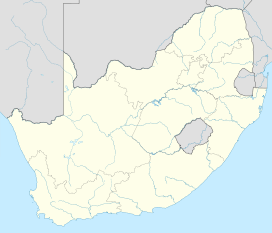Tsitsa River
| Tsitsa River | |
| iTsitsa | |
| River | |
| Name origin: Tsitsa meaning 'to trickle' or 'to ooze' in the Xhosa language, referring to the rain and snow falling on the Drakensberg slopes[1] | |
| Country | South Africa |
|---|---|
| State | Eastern Cape |
| Tributaries | |
| - right | Pot River, Mooi River, Inxu River |
| Source | Drakensberg |
| - location | SE of Rhodes |
| - elevation | 2,550 m (8,366 ft) |
| - coordinates | 30°58′S 28°3′E / 30.967°S 28.050°E |
| Mouth | Mzimvubu River |
| - location | SE of Qumbu |
| - elevation | 183 m (600 ft) |
| - coordinates | 31°17′52″S 29°13′32″E / 31.29778°S 29.22556°ECoordinates: 31°17′52″S 29°13′32″E / 31.29778°S 29.22556°E |
 Location of the Tsitsa River mouth | |
The Tsitsa River (Afrikaans: Tsitsarivier; Xhosa: iTsitsa) is a river in the Eastern Cape Province, South Africa. It is a tributary of the Mzimvubu River and belongs to the Mzimvubu to Keiskamma Water Management Area.
Course
The Tsitsa rises in the Drakensberg 15 km to the SE of Rhodes, about 80 km west of Mount Frere, and flows eastwards. The Tsitsa Falls are located in its upper course, amidst a mountainous area of great beauty. Bending and flowing southwards for a few miles, the river passes east of Maclear, before it bends eastwards again. Finally it empties into the Mzimvubu River while passing through deep river gorges about 36 km southeast of Qumbu.[2]
Its main tributaries are the Mooi River, Inxu River (Wildebeesrivier) and the Pot River.
The Tsitsa River used to form part of the western border of the former Transkei. Now the Tsitsa is a popular place for whitewater kayaking.[3]
Dams in the basin
There are only relatively small dams in the Tsitsa River basin. The Maclear Dam on the Inxu River supplies water to Maclear town and the Ugie Dam on the Mooi supplies water to Ugie town.[4]